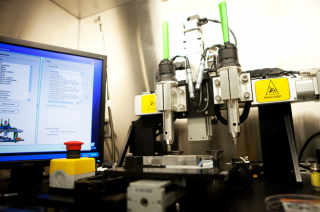The Knight Cancer Institute at Oregon Health & Science University (OHSU) in Portland has just announced an important partnership with San Diego-based bioprinting technology company Organovo. Research into the biology of cancer, especially how it metastasizes, has been complicated in the past by the limitations of animal models and cell cultures, which really don't tell us enough about the workings of cancer within a human being. Organovo creates living, 3-D human tissue using their bioprinting device, the NovoGen MMX (below). The partnership between OHSU and Organovo will allow cancer research at Knight Institute labs to much more closely model the complex architecture of malignancy within the human body, using in vitro tissue. Ultimately this will lead to the development of more accurate therapeutics and pre-clinical trials.
[The NovoGen MMX Bioprinter, courtesy of Organovo]
Though the news release announcing this collaboration between the world-renowned oncology researchers at OHSU and the cutting edge technology company only describes the use of generic engineered (bioprinted) human tissue, the promise of bioprinting for the future is in creating personalized tissue and eventually whole organs tailored to an individual. In other words, the bioprinted tissue used to test a drug therapy could be your tissue, cultured and printed from your genetic material. Or it could be breast or prostate tissue specifically. Not long from now we could progress from tissue (which is relatively simple) to organ systems, which could be used for research as well as for transplant replacement of diseased organs. For earlier blogs of ours discussing bioprinting, some of the challenges facing the new technology, and inroads to resolving those challenges (such as the complicated matter of vasculature), click here.
 One of the attractions of advancing Organovo's bioprinting technology at OHSU is the strong reputation of the Institute for innovation, particularly in the area of novel therapeutics. The widely-used tyrosine-kinase inhibitor Gleevec was developed from research by Knight Cancer Institute director Brian Druker, M.D. The drug acts by interfering with an enzyme needed by cancer cells to spread, without disrupting healthy cellular function. Of the OHSU-Organovo partnership, Dr. Druker said:
One of the attractions of advancing Organovo's bioprinting technology at OHSU is the strong reputation of the Institute for innovation, particularly in the area of novel therapeutics. The widely-used tyrosine-kinase inhibitor Gleevec was developed from research by Knight Cancer Institute director Brian Druker, M.D. The drug acts by interfering with an enzyme needed by cancer cells to spread, without disrupting healthy cellular function. Of the OHSU-Organovo partnership, Dr. Druker said:
"Better research models lead to a deeper understanding of disease mechanisms and more accurate information in the preclinical drug discovery and development process. We believe new technologies, like bioprinting, are important for producing more relevant models of cancer and metastasis to ultimately support the discovery of new therapeutics."
Cancer research funding at OHSU from the National Cancer Institute of the NIH is at $14.3M for the current fiscal year. Labs with over $1M of NCI funding in 2013 include those of:
- COUSSENS, Lisa Marie -- $1.3M for 4 projects
- DRUKER, Brian J -- $1.66M for 4 projects
- GRAY, Joe W -- $2.37M for 1 project
- WONG, Scott W -- $1.2M for 2 projects
Biotechnology Calendar, Inc. is in the business of bringing life science researchers together with scientific sales professionals to network and exchange valuable information about laboratory research and the latest tools and techniques for getting it done optimally. Now going into our 21st year of scientific event planning and marketing on research campuses across the US, we're looking forward to our next (11th annual) Portland BioResearch Product Faire Front Line show on the OHSU campus, to be held on September 12, 2013.



